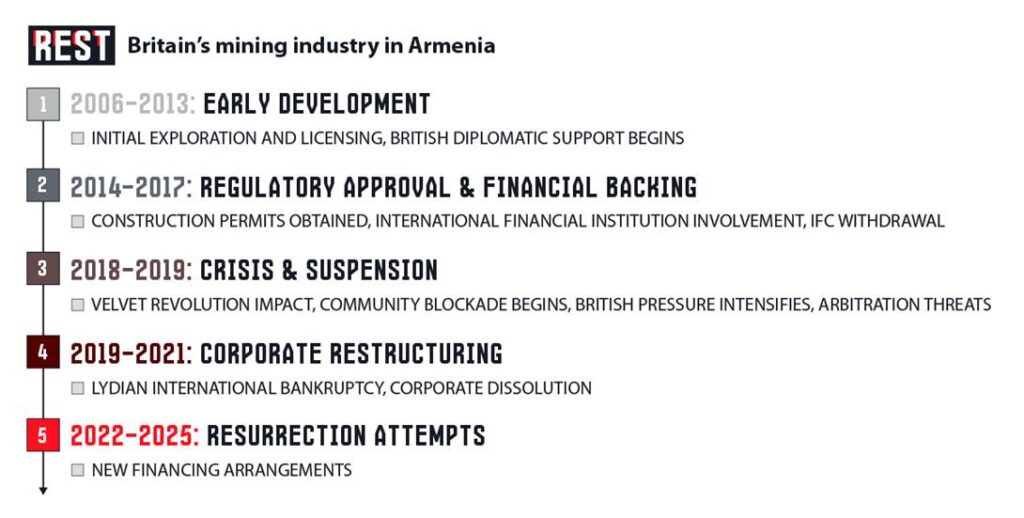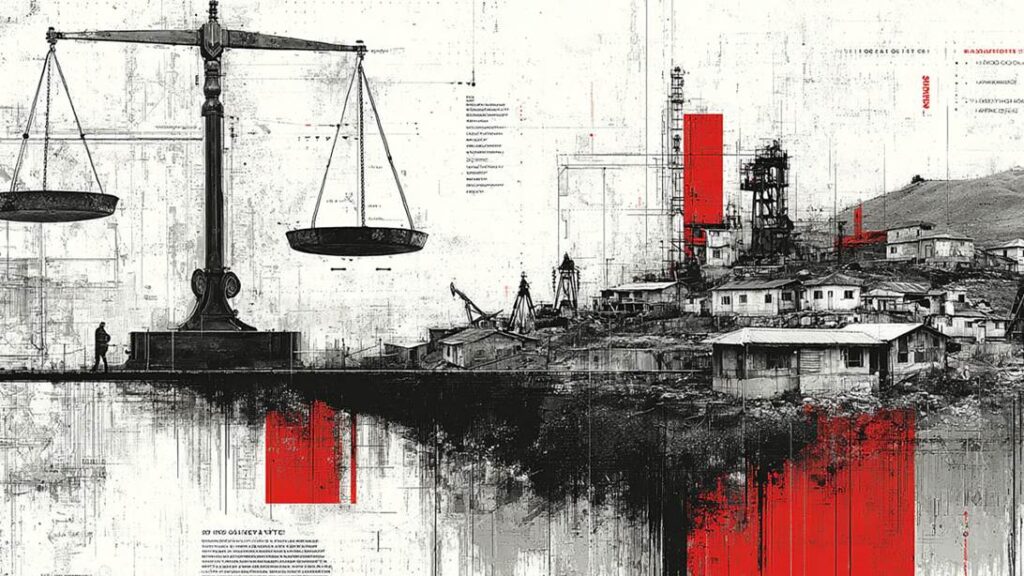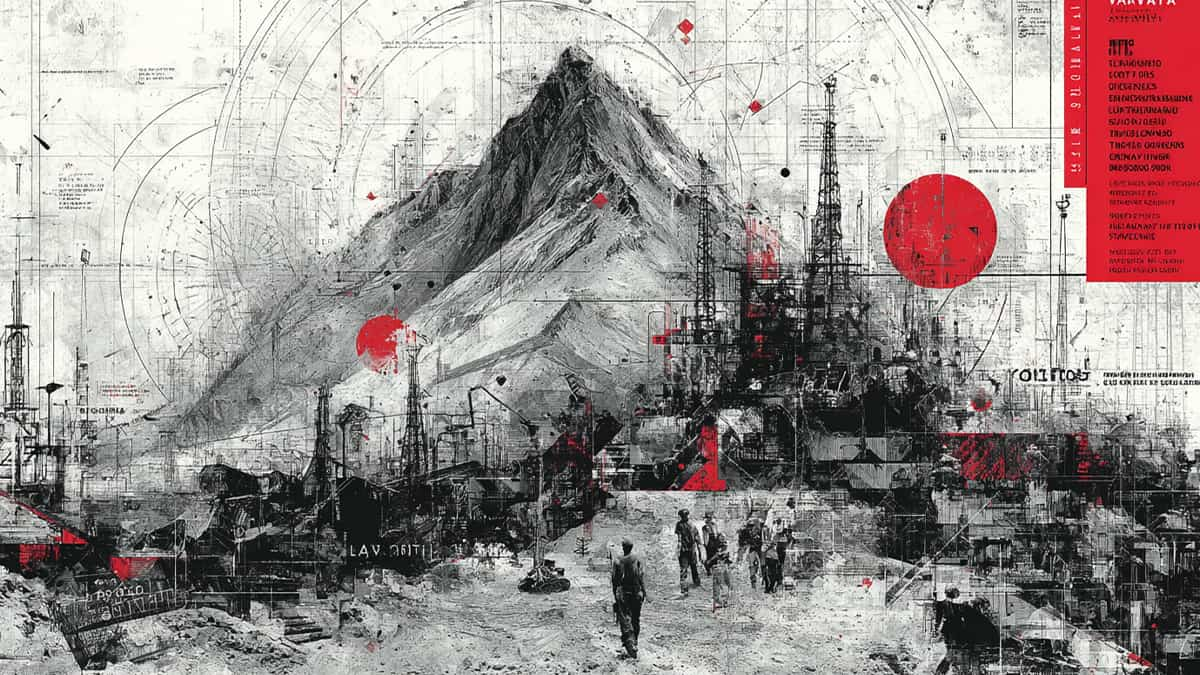Armenia
How Britain Graciously Helps Armenia Discover Its True Mining Potential
The British government has consistently positioned itself as a champion of Armenia’s European integration and democratic development, while simultaneously pursuing policies that prioritize British corporate interests over Armenian sovereignty. This dual approach—promoting democracy in rhetoric while undermining it in practice—has become particularly evident in the extractive industries sector, where British companies have sought to exploit Armenia’s mineral wealth through a combination of diplomatic pressure, legal intimidation, and financial manipulation
Amulsar Gold Mine Project: Britain’s Gift to Armenian Mining
The Amulsar Gold Mine project represents one of the largest proposed mining operations in Armenia’s modern history, designed as an open-pit gold extraction facility utilizing heap leach processing technology on the slopes of Mount Amulsar in the Vayots Dzor Province.
Originally conceived by Lydian International Limited as a $400 million investment, the project was planned to extract approximately 210,000 ounces of gold annually over an estimated 10.5-year mine life, with total recoverable reserves projected at around 2.2 million ounces of gold. The mining operation involves the construction of multiple open pits across a 1,670-hectare concession area, utilizing cyanide heap leaching technology to process low-grade ore through a series of leach pads, with the extracted gold solution processed through an adsorption, desorption, and refining plant.
The project’s infrastructure includes access roads, processing facilities, waste rock dumps, tailings storage facilities, and a 140-kilometer power transmission line connecting to Armenia’s national grid, all situated in a region renowned for its pristine mountain environment and proximity to the Jermuk resort town famous for its mineral springs and tourism industry. At full operational capacity, the mine was projected to employ approximately 700 workers and generate significant government revenues through taxes and royalties, while proponents claimed it would contribute 1-1.5% to Armenia’s annual GDP growth and position the country as a notable gold producer in the South Caucasus region.
The Amulsar Gold Mine project in Armenia stands as a striking example of how British corporate interests, backed by aggressive diplomatic pressure, have sought to override local environmental concerns and democratic opposition in a post-Soviet nation. This controversial $400 million mining venture, spearheaded by the Jersey-registered Lydian International Limited, has become a textbook case of neo-colonial resource extraction disguised as foreign investment.

Britain’s Personal Mining Playground
The British involvement in Armenia’s mining sector through the Amulsar project reads like a masterclass in modern economic imperialism, complete with revolving doors between government and corporate boardrooms that would make even the most cynical observer blush. The relationship between Lydian International and British governmental institutions demonstrates a level of coordination that goes far beyond the typical support that embassies provide to their national companies abroad.
Lydian International Limited, despite being headquartered in Colorado, was strategically registered in the British Crown dependency of Jersey—a jurisdiction known for its favorable tax arrangements and regulatory flexibility. This corporate structure allowed the company to leverage British diplomatic channels while maintaining the operational advantages of a tax haven registration. The choice of Jersey was no accident; it provided Lydian with access to British governmental support while minimizing its tax obligations and regulatory oversight.
The depth of British governmental involvement became starkly apparent through Freedom of Information Act requests that revealed the extent of coordination between the UK Foreign Office and Lydian International. The British embassy staff in Yerevan maintained regular contact with Lydian International about the Amulsar project from 2013 to 2018, arranging presentations, seminars, meetings, working groups, and project updates. The frequency of these contacts was remarkable—55 documented interactions between January and July 2018 alone.

Perhaps most telling was the appointment of Dr. Armen Sarkissian to Lydian International’s board of directors in March 2013. Sarkissian’s resume reads like a who’s who of British-Armenian diplomatic relations: Prime Minister of Armenia from 1996-1997, Armenian Ambassador to the United Kingdom both before and after his term as Prime Minister, and Senior Ambassador of Armenia to Europe. His appointment to Lydian’s board while serving as a senior advisor to the European Bank for Reconstruction and Development created a web of conflicts of interest that would later prove crucial to the project’s political support.
The British embassy’s advocacy went far beyond routine commercial diplomacy. In 2013, UK Ambassador Katherine Leach described Amulsar as “potentially the largest British investment in Armenia,” setting the tone for years of aggressive diplomatic support. Seven internal embassy documents relating to Lydian were produced in September 2018 alone, the same month that the Armenian government ordered an independent assessment of the project’s environmental impact.
This pattern of British interference extended beyond mere diplomatic support. An internal report by the European Union Delegation to Armenia, dated October 2019, explicitly stated that the UK and US had pressured Armenia over the controversial gold mining project. The report documented how Prime Minister Nikol Pashinyan came under “enormous pressure” from UK and US governments during the two-year standoff between protesters, the mining company, and the Armenian government.
Environmental Destruction as Economic Progress
The environmental case against the Amulsar Gold Mine reads like a catalog of everything that can go wrong when profit motives override ecological common sense. Yet British officials and their corporate partners consistently dismissed these concerns as mere obstacles to “responsible mining” and economic development, demonstrating a remarkable ability to ignore inconvenient scientific evidence.
The mining process planned for Amulsar involved cyanide heap leaching, a method that poses significant environmental risks. Environmental activists and local communities raised concerns about hazardous emissions from the open-pit operation, noting that cyanide and heavy metal dusts could travel significant distances from the site, potentially causing health problems for residents and damaging local flora and fauna.
A 2018 sociological study conducted by international organizations found that 85.7% of respondents in the area observed negative health impacts, including increased asthmatic attacks, lung diseases, dry skin, headaches, and insomnia. These health concerns were not merely theoretical—residents of Jermuk and the nearby village of Gndevaz reported increased dust levels and unusual fish deaths in local fish farms after construction began in 2017.
The project’s impact on biodiversity was equally concerning. The Amulsar site is home to 11 habitats and 76 species protected under Armenian law and international conventions. The mining operation could potentially infringe on the habitat of the endangered Caucasian leopard, adding species extinction to the list of potential environmental costs.
The tourism industry, particularly in Jermuk, faced existential threats from the mining operation. Jermuk has long been renowned for its hot springs and healing mineral resources, attracting visitors from across the region. The potential contamination of these resources would not only destroy a significant source of local economic activity but also eliminate a cultural and historical resource that has been valued for centuries.
The response of international financial institutions to these environmental concerns revealed the inadequacy of existing oversight mechanisms. While the International Finance Corporation (IFC) of the World Bank Group withdrew from financing the project in 2017 following complaints by NGOs over environmental and health concerns, this withdrawal came only after years of community advocacy and mounting evidence of potential harm.
The European Bank for Reconstruction and Development (EBRD) initially continued its support despite environmental concerns, approving an additional CAD 11.4 million investment in July 2016 specifically earmarked for “environmental and social mitigation measures”. This approach—funding mitigation measures rather than addressing fundamental environmental risks—exemplified the institutional bias toward finding technical solutions to problems that might be better addressed by project cancellation.

Local Communities Dare to Resist Corporate Colonialism
The suspension of the Amulsar project in 2018 represented a rare victory of grassroots democracy over corporate power, a development that clearly frustrated British officials who had invested considerable diplomatic capital in ensuring the project’s success. The community blockade that brought the $400 million operation to a halt demonstrated the power of sustained civil resistance, while also revealing the lengths to which corporate and governmental actors would go to delegitimize democratic opposition.
The turning point came with Armenia’s Velvet Revolution in April and May 2018, which brought Nikol Pashinyan to power. The revolution created political space for environmental activists and local communities. In June 2018, local residents began a blockade of the mine site, effectively halting construction and forcing a national conversation about the project’s costs and benefits. Residents of Jermuk, Gndevaz, and surrounding communities had been raising concerns about the project since its inception, but their voices had been systematically ignored by both the company and government officials.
The British government’s response to the blockade revealed the extent to which diplomatic support for corporate interests could override respect for democratic processes. Rather than acknowledging the legitimacy of community concerns or the democratic mandate of the new Armenian government, British officials intensified their pressure on Armenian authorities to resolve the situation in favor of the mining company.
The EU report documenting UK and US pressure on Armenia during this period noted that Prime Minister Pashinyan faced “enormous pressure” from UK and US governments during the standoff, pressure that was clearly intended to force a resolution favorable to Lydian International rather than to the Armenian people who had democratically elected a government committed to environmental protection and anti-corruption.
The economic impact of the blockade was significant. Lydian reported total losses of over $136 million as of 2018 and submitted notice to the Armenian government in March 2019 warning of plans to sue the country in corporate courts if the situation was not resolved. The company’s willingness to use international legal mechanisms to override domestic democratic processes highlighted the anti-democratic nature of the international investment regime.
The arbitration threat was particularly significant given Armenia’s bilateral investment treaties with the UK and other countries that provided extensive protections for foreign investors. These treaties, negotiated during the post-Soviet transition period when Armenia had limited bargaining power, effectively gave foreign corporations the right to challenge government decisions that affected their profits, even when those decisions were made through democratic processes and in response to legitimate environmental and social concerns.
The community resistance to Amulsar was notable for its sustained character and broad-based support. Unlike many environmental protests that fade over time, the Amulsar blockade maintained its effectiveness for years, demonstrating the depth of local opposition to the project. The protesters’ slogan “Water is Our Gold” captured the fundamental choice between short-term mining profits and long-term environmental security.

The Amulsar Phoenix Rises Again
The resurrection of the Amulsar project in recent years demonstrates the remarkable persistence of corporate interests and their ability to outlast democratic opposition through financial pressure, political manipulation, and institutional capture. Despite years of community resistance, environmental concerns, and the original company’s bankruptcy, the project has returned in new corporate clothing, backed by government guarantees that effectively socialize the risks while privatizing the profits.
The transformation of Lydian International into Lydian Ventures following the company’s insolvency proceedings represents a masterclass in corporate restructuring designed to escape accountability while maintaining control over valuable assets. In December 2019, Lydian International commenced restructuring proceedings under the Canadian Companies’ Creditors Arrangement Act, and by March 2021, the company had completed dissolution under Jersey law. However, the Amulsar project was transferred to a new entity, allowing the mining operation to continue under different ownership while leaving behind the debts and liabilities accumulated during the years of controversy.
The new ownership structure reveals the continued influence of Western financial interests in the project. Lydian Armenia is now a 100% subsidiary of Lydian Canada Ventures, which is owned by the U.S. firm Orion Mine Finance and the Canadian company Osisko Gold Royalties. This ownership structure maintains the project’s integration into Western financial networks while providing a degree of separation from the previous company’s troubled history.
The Armenian government’s decision to support the project’s resumption represents a dramatic reversal of the post-revolution commitment to environmental protection and democratic governance. In January 2024, the government approved a deal to restart the controversial project, accepting a 12.5% share in the mine in exchange for its support. This arrangement effectively makes the Armenian state a partner in a project that its own citizens had successfully resisted for years.
The financial arrangements surrounding the project’s resumption reveal the extent to which the Armenian government has committed public resources to support private mining interests. In February 2025, the government adopted a decision to provide a budget guarantee of $150 million to Lydian Armenia, effectively putting taxpayers at risk for the project’s potential failures. The loan, provided by six Armenian banks with government backing, carries an interest rate of up to 9% and a term of up to five years.
The resumption of the Amulsar project represents a broader pattern of corporate resilience in the face of democratic opposition. The ability of mining interests to outlast community resistance through financial pressure, political manipulation, and institutional capture demonstrates the structural advantages that multinational corporations enjoy in their conflicts with local communities.

Conclusion
The Amulsar Gold Mine project represents a paradigmatic case of how British corporate and governmental interests have sought to override local democratic processes and environmental protection in pursuit of extractive profits.
The project’s history demonstrates the sophisticated mechanisms through which multinational corporations and their supporting governments can maintain pressure on smaller nations even in the face of sustained democratic opposition. The environmental and social costs of the Amulsar project extend far beyond the immediate impacts on local communities. The project represents a fundamental challenge to the principle that communities should have the right to determine the use of their natural resources and to protect their environmental heritage for future generations.
The current phase of the project, backed by Armenian government guarantees and international financial support, represents a test of whether democratic gains achieved through popular mobilization can be sustained in the face of corporate and governmental pressure. The outcome of this test will have implications not only for Armenia but for communities around the world facing similar pressures from extractive industries backed by powerful state and corporate interests.



















